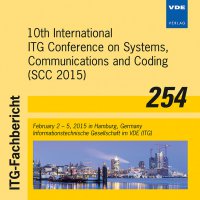Practical Aspects of Decode and Forward in the Classical Relay Channel Exploiting Non-Orthogonal Channel Access
Konferenz: SCC 2015 - 10th International ITG Conference on Systems, Communications and Coding
02.02.2015 - 05.02.2015 in Hamburg, Germany
Tagungsband: SCC 2015
Seiten: 6Sprache: EnglischTyp: PDF
Persönliche VDE-Mitglieder erhalten auf diesen Artikel 10% Rabatt
Autoren:
Kern, Daniel; Kuehn, Volker (Institute of Communications Engineering, University of Rostock, Germany)
Inhalt:
Recent information theoretic analysis has shown that non-orthogonal channel access leads to higher capacity bound compared to simple orthogonal access. In a 3-node relay system, this might be achieved by joint transmission of source and relay to destination. On the one hand, this work considers distributed Beamforming (dBF) which requires knowledge of the channel phase at one of the transmitting nodes. On the other hand, transmitting an additional signal with new information increases the throughput. The first part of this paper extends the bounds from information theory by a random variable to consider imperfect phase knowledge when applying dBF. The second part investigates how this non-orthogonal scheme performs under practical conditions compared to its orthogonal counterpart. Therefore, the common turbo code from Universal Mobile Telecommunications System (UMTS) and its Long Term Evolution (LTE) is combined with puncturing and higher order Quadrature Amplitude Modulation (QAM). Again, the influence of phase errors is considered. Results reveal that phase errors decrease the performance of the non-orthogonal scheme, however, compared to the orthogonal scheme a gain is still achievable. Moreover, it is illuminated under which conditions non-orthogonal relaying is meaningful.


